Sweets Making & Kimono Tea Ceremony at Tokyo Maikoya
At Tokyo Maikoya, visitors can indulge in a unique cultural experience that combines a traditional Japanese tea ceremony, a hands-on sweets-making workshop, and a kimono dressing and photo opportunity. In the heart of Asakusa, this intimate and personalized experience allows participants to enjoy Japan’s rich heritage, crafting delicate wagashi treats to pair with Matcha green tea. With an expert guide, guests explore the art of mindfulness and appreciation for nature, all while surrounded by serene traditional Japanese decor and utensils. As they explore this unique experience, they’ll uncover the cultural significance of tea and more.
Just The Basics
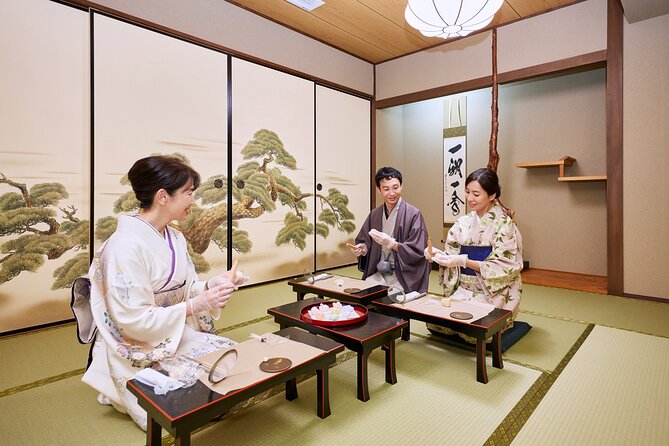
• Experience a traditional Japanese tea ceremony, emphasizing harmony and tranquility, in a serene atmosphere with traditional decor and utensils.
• Learn the art of Japanese sweets making, crafting delicate wagashi treats to pair with Matcha, under the guidance of an expert instructor.
• Dress up in traditional Japanese attire, complete with intricately designed kimonos, and take stunning photos amidst the serene surroundings of the tea house.
• Discover the cultural significance of tea in Japan, extending beyond a simple beverage to encompass spiritual, social, and ceremonial aspects.
• Enjoy an intimate and personalized experience in the heart of Tokyo’s historic Asakusa neighborhood, with a maximum of 15 travelers.
It's also worth checking out some other tours and experiences nearby.
Traditional Japanese Tea Ceremony
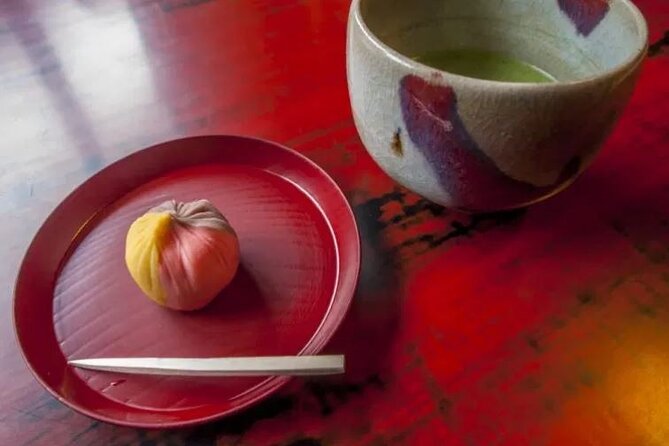
In a tranquil setting, guests participate in a traditional Japanese tea ceremony, a highly ritualized and choreographed event steeped in history and cultural significance.
This centuries-old tradition is a quintessential part of Japanese culture, emphasizing harmony, respect, and tranquility.
The ceremony is conducted with precision, following a strict protocol that has been refined over time.
Guests are treated to a serene atmosphere, surrounded by traditional Japanese decor and utensils.
The ceremony master guides participants through the intricacies of the ceremony, highlighting the importance of mindfulness and appreciation for nature.
As guests savor the delicate flavors of Matcha green tea, they’re immersed in a truly immersive cultural experience.
Sweets Making Workshop Experience
While steeped in tradition, the tea ceremony is often paired with modern twists, and one such innovation is the art of Japanese sweets making, where participants can learn the intricacies of crafting delicate wagashi treats to pair with their Matcha.
During the sweets making workshop, you will get hands-on experience in creating traditional Japanese sweets, known as wagashi, under the guidance of an expert instructor.
They’ll learn about the significance of sweets in Japanese culture and the art of pairing them with tea.
With a focus on detail and precision, you will learn to craft beautiful and delicious sweets, taking home their creations as a memorable souvenir.
Kimono Dressing and Photo Ops
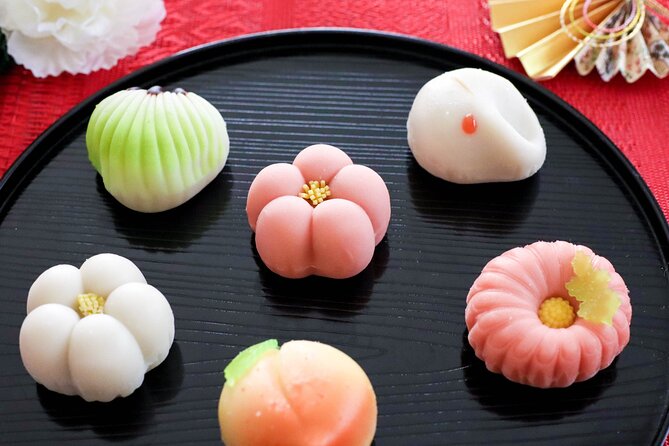
As a unique and memorable part of the experience, participants can dress up in traditional Japanese attire, complete with intricately designed kimonos, and take stunning photos amidst the serene surroundings of the tea house.
This immersive experience allows guests to fully embrace Japanese culture, donning kimonos that have been carefully selected to complement the tranquil atmosphere of the tea house.
With the beautiful gardens and traditional architecture serving as a picturesque backdrop, participants can capture unforgettable memories with friends and family.
The kimono dressing and photo opportunity is a highlight of the experience, providing a unique chance to connect with Japanese traditions and take home lasting memories.
Cultural Significance of Tea
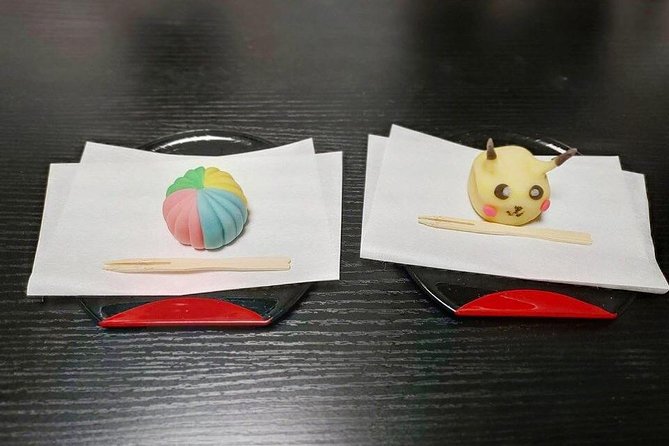
Tea has been an integral part of Japanese culture for centuries, with its significance extending far beyond a simple beverage to encompass spiritual, social, and ceremonial aspects.
In Japan, tea isn’t just a drink, but an experience that embodies harmony, respect, and tranquility.
The traditional Japanese tea ceremony, also known as Chanoyu, Sado or Ocha, is a highly ritualized and choreographed ceremony in which green tea, called Matcha, is prepared and served to guests in a specially designed room.
This ceremony isn’t just about drinking tea, but about the art of being present in the moment, appreciating the beauty of nature, and honoring the spirit of hospitality.
What to Expect in Asakusa
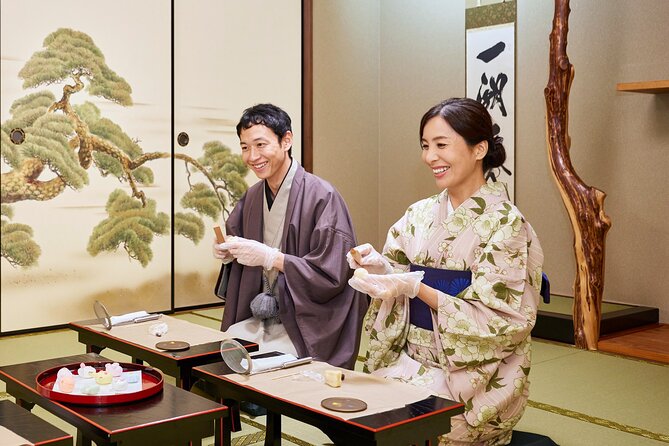
In the heart of Tokyo‘s historic Asakusa neighborhood, the traditional tea house awaits, ready to transport participants into a serene atmosphere where centuries-old customs come alive.
As participants step into this tranquil oasis, they can expect to enjoy a unique cultural experience.
The tea house’s serene ambiance sets the tone for a fascinating exploration of Japan’s rich heritage.
With a maximum of 15 travelers, the experience is intimate and personalized.
Participants will have the opportunity to learn about the cultural significance of tea, practice making traditional sweets, and even dress up in a kimono or traditional clothing.
The picturesque setting also provides a stunning backdrop for capturing unforgettable memories.
Reviews and Ratings Overview
With a stellar 5.0 rating based on 32 reviews, this cultural experience has consistently impressed travelers with its unique blend of tradition and fun.
Every single reviewer has given a 5-star rating, a testament to the exceptional quality of this activity.
The reviews highlight the warm hospitality, attention to detail, and the unique opportunity to take in Japanese culture.
Travelers praise the kimono dressing, sweet-making, and the tranquil tea ceremony, which create an unforgettable experience.
The unanimous 5-star rating is a clear indication that this activity exceeds expectations, making it a must-do for anyone interested in Japanese culture.
Booking Details and Policies
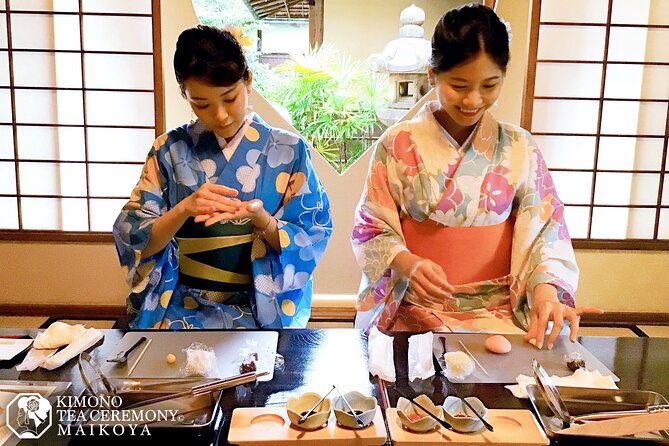
When booking this cultural experience, travelers should be aware of the cancellation and refund policies to ensure a smooth and hassle-free experience.
Maikoya’s policies state that cancellations made up to 24 hours in advance are eligible for a full refund. However, no refunds will be provided for cancellations made less than 24 hours before the start time.
Plus, no changes will be accepted within 24 hours of the activity.
It’s essential to note that cut-off times are based on local time.
Getting Ready for the Activity
For this traditional Japanese cultural activity, it’s best to dress in comfortable clothing that allows for ease of movement.
This is because you will be sitting on the floor during the tea ceremony and standing while making sweets.
Wearing loose, breathable clothing like cotton or linen is recommended.
Plus, it’s a good idea to wear socks, as shoes will be removed before entering the tea house.
Avoid wearing strong perfumes or colognes, as they may interfere with the delicate flavors of the sweets and tea.
Here's a few more nearby tours and experiences we think you'll like.
Frequently Asked Questions
Are Children Allowed to Participate in the Tea Ceremony?
She confirms that there’s no specific age restriction mentioned, but considering the 15-person maximum and the activity’s cultural significance, it’s unlikely suitable for young children, and parental discretion is advised.
Can I Bring My Own Camera for the Photo Opportunities?
She can bring her own camera to capture memories during the activity, as there are designated photo opportunities, allowing her to take stunning photos in the beautiful setting while dressed in a kimono.
Are There Vegetarian or Gluten-Free Sweet Options Available?
She inquires about dietary restrictions, asking if vegetarian or gluten-free sweet options are available, which is essential for participants with specific needs, ensuring a more inclusive and accommodating experience.
Are the Kimonos Provided Clean and Sanitized Between Uses?
She ensures that kimonos are thoroughly cleaned and sanitized between uses, maintaining high hygiene standards to provide a comfortable and healthy experience for participants, alleviating any concerns about cleanliness.
Can I Bring a Friend Who Doesn’t Participate in the Activities?
She can bring a friend who doesn’t participate in the activities, but the friend must still pay the full activity fee since they’ll occupy a spot and use the facility’s resources.
Not for you? Here's more of our most recent tour reviews happening neaby
- Art Calligraphy – Write Your Aspirations for With Colours
- 3 Hour Photoshoots Tour in Tokyo
- Private Customized Tour With Local Guide in Tokyo
- Tokyo Asakusa Tour and Shrine Maiden Ceremonial Dance Experience
- Shodō Creative Japanese Calligraphy Experience
- Koto Japanese Traditional Instrument Experience
- Special Price Couple (2 People) Kimono Commemorative Photo Shoot in Asakusa, Tokyo HANAYAKA Kimono & Yukata Rental Offer
- Tokyo Private Photoshoot Experience With a Professional Photographer
- Best of Tokyo City Walking Tour for Kids and Families
- Private Sightseeing Tour Visit in Kyoto With Transfer Included
- Asakusa: Ultimate 3-Geisha Experience for Group of Max 4 After History Tour
- 3 Hour Private Tour in Tokyo Asakusa
- Japanese Paper Washi Making Experience in Asakusa
- Refreshing in Asakusa! Tile-Breaking / Kawara Smash in Asakusa, Tokyo
- No Bitter Matcha! Casual Tea Ceremony Experience With the Finest Tea Leaves
Final Words
As she concludes her journey at Maikoya, she takes with her a deeper understanding of Japan’s rich cultural heritage and the art of traditional sweets making.
With memories of the serene tea house and the delicate flavors of Wagashi sweets, she departs with a newfound appreciation for the intricacies of Japanese tradition.
The experience will linger, a testament to the beauty of culture in Tokyo’s historic Asakusa neighborhood.
